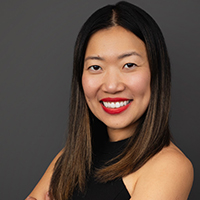

Kathy Zhu is the co-founder, CEO, and general counsel of Streamline AI, the only intelligent intake and workflow automation platform purpose-built for in-house legal teams. Founded in the Bay Area in 2020, the AI-powered, no-code intake platform delivers visibility and metrics across G&A business units, starting with legal teams. Previously, Kathy was senior director and associate general counsel for commercial and legal operations at DoorDash and director and senior counsel at Medallia. She was a corporate associate in Wilson Sonsini’s Palo Alto office from 2011 until 2014, and earned her J.D. from the University of Michigan Law School.
We recently spoke with Kathy about her time at Wilson Sonsini, her career path, and her advice for others, among other topics.
Did you choose a legal career or did it choose you?
I was definitely not one of those children who grew up dreaming about becoming a lawyer! In fact, I had my heart set on practicing medicine because I really liked the thought of helping people. Little did I know that wish would get fulfilled in a very different way.
Everything came to a head for me when I was in college at the University of Notre Dame, when I was selected for an exclusive study abroad program at the University of Oxford to study English literature. If I wanted to stick with my pre-med degree and go on the Oxford program, I'd have to add at least one extra semester to fulfill all my science prerequisites, which I was less than thrilled about. At the same time, I discovered that there was more to being a lawyer than just litigating, and it would be possible to practice corporate law. I decided to drop pre-med, go to Oxford, graduate with a degree in English, and then enroll in law school.
Could you tell us a bit more about your career trajectory, including your time at Wilson Sonsini?
I was very fortunate to start my legal career at Wilson Sonsini. I was in what was then known as the Sheridan-Maillard group, supporting earlier-stage start-ups with incorporations, venture financings, and corporate governance work. That was when I was first bitten by the start-up bug. After working on a couple of M&A transactions and IPOs, I really wanted to get closer to the action on the client side. In 2014, I joined Medallia’s commercial transactions team. After four years at Medallia and working on some very exciting deals, including the largest deal in company history, DoorDash came knocking. They asked me to join as their first commercial lawyer to build that function from the ground up. It was at DoorDash that I experienced first-hand the pain points that led to the creation of Streamline AI. So, looking back on all of that, I can see how each of these steps in my career provided invaluable experience and enabled me to meet people who have helped and guided me in critical ways, ultimately leading me to where I am today.
How did you find the experience of moving in-house? Do you have any advice for those looking to do the same?
I absolutely loved my experience in-house. Of course, there was a big culture shock at first, since your client list automatically expands to cover every single person at the company—anyone can send you an email or Slack message, or ambush you at your desk, to ask for your guidance. I felt that I could be a much better lawyer as well, because I was able to funnel all of the legal analysis through the lens of what would matter to the business—for some reason, that way of thinking was more intuitive to me. I also loved the hyper-fast pace of the work, too; being able to Slack anyone to get instantaneous feedback on what was happening was very gratifying.
Of course, there’s another side to all of this, which is that in-house lawyers often feel very understaffed and overwhelmed by the requests flooding in from all directions—and this is the pain point that we created Streamline AI to address. My advice to folks looking to move in-house is to learn as much as you can about what your business clients care about, and try to be as scrappy and entrepreneurial as you can in how you approach your work. It puts you in the right mentality to be an effective in-house counsel.
What would you say were the biggest challenges and opportunities during the pandemic?
I feel very fortunate to have been working at DoorDash during the pandemic. Every business had to figure out how to transact online overnight, which was very painful for brick-and-mortar establishments—but DoorDash was already engineered for that from the start. What we needed to figure out was how to enable business operations to function remotely without impacting efficiency or effectiveness, and also to ensure that consumers felt safe through contactless delivery. We saw a massive uptick in orders, as families all over the world counted on us to have meals and other essential items delivered in a way that felt safe. As with anything, huge challenges also bring massive opportunities to those who are able to figure out a path forward.
How have you been able to achieve work-life balance? What do you do to unwind?
I'm in the camp that believes that true work-life balance is elusive, especially for start-up founders. What I aim for is work-life integration, which means that I am flexible in terms of when and where I do my work, so I can fit in a trip to the gym or run an errand during low-traffic times and actually save more time. Weirdly, I work more now than I have at any other time in my life, but I am also the happiest and most fulfilled. Work used to be something that I wanted to get away from, but it doesn't feel like work when you’re doing something you love. I find that establishing daily habits for self-care is essential. For example, I start each day with a meditation practice that grounds me and sets me up for success for the rest of the day. I also adore traveling, so I try to go on a short trip every couple of months for a few days to recharge my batteries.
What did you learn from your time at Wilson Sonsini?
Probably the most valuable thing I learned is a client-first mentality. I remember working on a leanly staffed IPO with a very tight timeline, and one day when we were deep in the thick of things, the partner on the deal asked me and the senior associate I was working with, “Is the GC happy?” I started going into a tricky, substantive issue that we had just solved for the GC, and the partner stopped me and asked again, “Is the GC happy?” That's when it dawned on me that client service meant more than just solving the issues; the experience mattered most of all. That fundamentally influenced the approach I took when I transitioned in-house. What I’ve told the people I've mentored and managed over the years is that one or two years down the road, your business clients won't remember the most brilliant piece of legal advice you gave them, but they will remember how you made them feel.
How has being part of the Wilson Sonsini network impacted your current role?
The friends I made during the time I spent at Wilson Sonsini have made a huge impact on what I'm doing now. In particular, Lang Liu has been a big supporter of ours, and I'm so grateful. We met each other on our first day on the job as first-year associates over a decade ago and have stayed friends ever since. We were bridesmaids at each other's weddings, and now there's no one else I'd go to for legal advice! I've come across other Wilson Sonsini alums at companies that I've worked at, and now some of them are also our customers. There's definitely something special about running into someone else who is also part of this network.
What’s something interesting that people would be surprised to learn about you?
I lived on four continents before the age of 16! I was born in Shanghai, and then my parents moved to Adelaide, Australia, where my dad earned his Ph.D. Then we lived in Manchester, England, for almost nine years. I had a proper British accent when we moved to the U.S., which I then lost within six months!
- Privacy Policy
- Terms of Use
- Accessibility